Meet Our Members: Open Gate-La Strada Macedonia
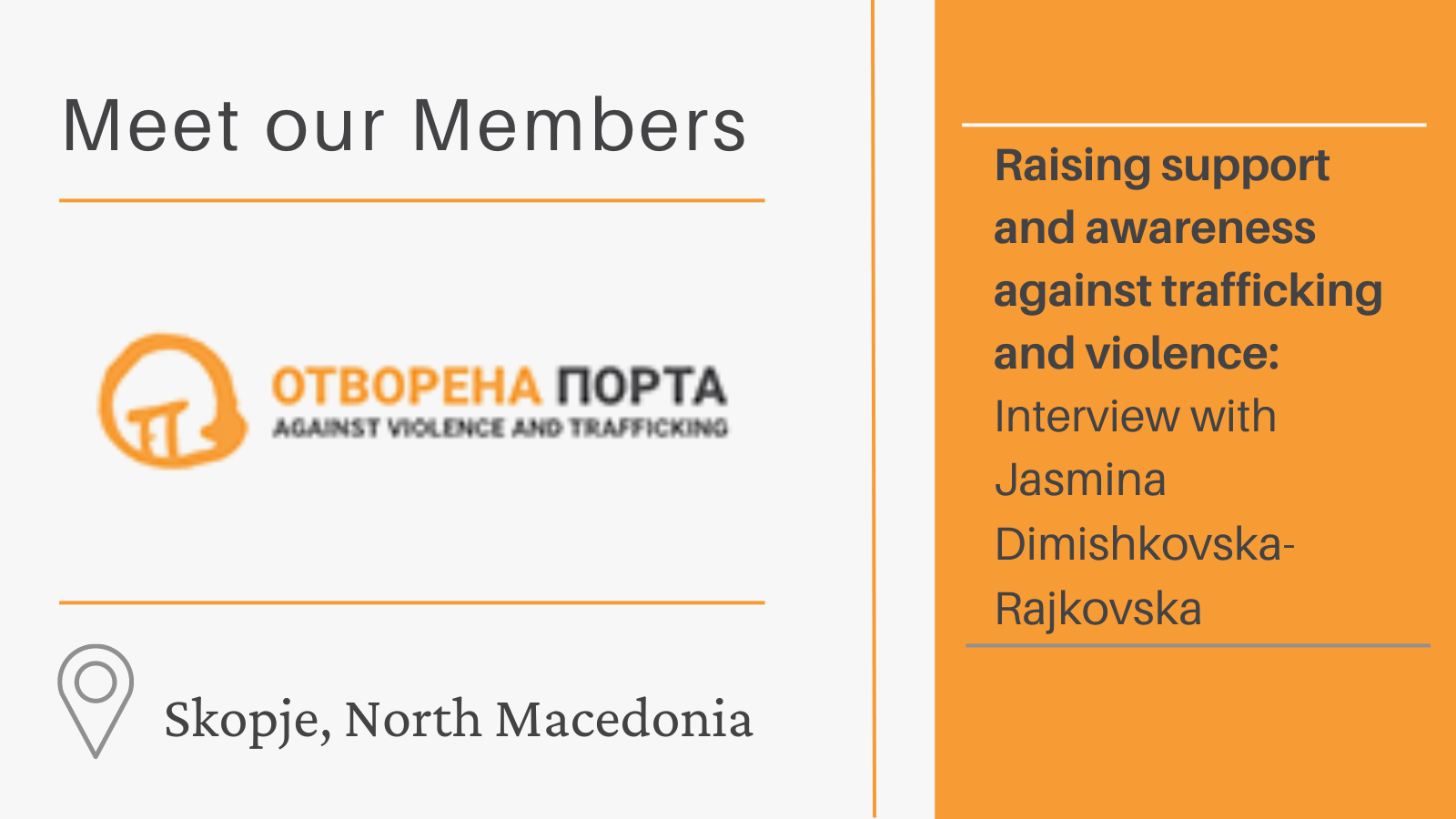 The Association for Action Against Violence and Trafficking in Human Beings – Open Gate is a member of GAATW in North Macedonia. In July 2022, Maya Linstrum-Newman from GAATW International Secretariat conducted this interview with Jasmina Dimishkovska-Rajkovska, the President of Open Gate, to learn more about the organisation’s history, current programmes, successes and challenges.
The Association for Action Against Violence and Trafficking in Human Beings – Open Gate is a member of GAATW in North Macedonia. In July 2022, Maya Linstrum-Newman from GAATW International Secretariat conducted this interview with Jasmina Dimishkovska-Rajkovska, the President of Open Gate, to learn more about the organisation’s history, current programmes, successes and challenges.
Maya Linstrum-Newman: Thank you for making time for this interview. When was La Strada Macedonia founded and why?
Jasmina Dimishkovska-Rajkovska: Back in 2000, when the Balkans were burning in wars, with the Serbia war, and with the Kosovo war, there were a lot of international forces in the region, increasing the demand for sexual services in the whole region. A huge number of women from Ukraine, Moldova, Bulgaria, Romania, were brought to the country. Most of them were promised jobs somewhere else in Europe but ended up stuck in Macedonia, as victims of trafficking. They were kind of invisible to the state, invisible to law enforcement. We recognised that and we decided that something should be done and together with a few enthusiastic people, we set up an organisation that would help these women and would prevent trafficking in human beings.
MLN: What are the main issues you are working on at the moment? What is your focus, who are your target groups to assist/support?
JDR: Our main focus of work is the protection of trafficked persons but throughout the years, we have expanded a little bit. I’ll come to that later.
With regard to addressing trafficking, we focus on three main topics, starting with improving the code for victims’ rights, then improving access to justice, and finally improving services for victims.
We also have a huge prevention programme. We work with at-risk people and with professionals to enhance their capacity to recognise signs of trafficking, the push factors, the risks; to encourage them to refer victims and to respond properly once victims have been identified. In this professionals’ group, we also work with professional staff in schools, including psychologists and social workers.
We build the capacity and skills of police officers and social workers in the centres for social work, as well as judges, prosecutors, and lawyers.
Additionally, we created a national NGO platform, together with other NGOs in the country, training them on trafficking issues. We provide them with a general introduction to trafficking, then share with them methods for prevention, identification and for referring victims to available services.
Then our third programme is advocacy. Here we are advocating for victims’ rights and their access to justice. At the moment, we are working on the adoption of a law on compensation for victims of trafficking. We drafted the law together with partners from the Ministry of Justice, international organisations, the Ministry of Labour and Social Policy, the Ministry of Interior and some prosecutors.
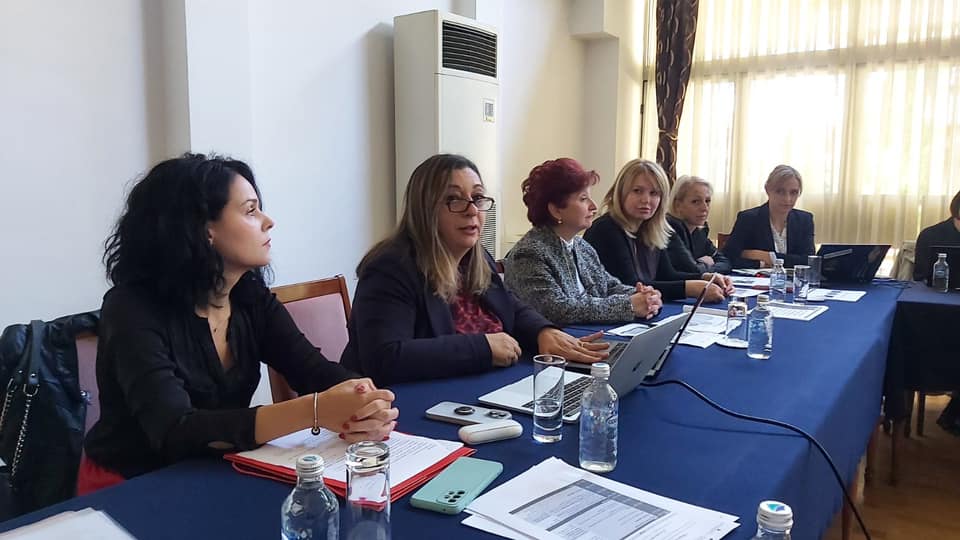 |
| President of Open Gate, Jasmina Dimishkovska Rajkovska as part of a trainers team who conducted training on "Strengthening regional cooperation and strengthening mechanisms for victims and potential victims of human trafficking” in October 2022 |
We’ve been working on this issue for many years and it is now in the final stages and should be put on the agenda of Parliament soon. We are hoping that by mid-2023 the law will be debated in Parliament and adopted. Now we have the hardest task ahead of us, which is to lobby Members of Parliament to vote for the law.
As trafficking is connected with other different social phenomena, we also support undocumented migrants. At the moment we are focusing on refugees and migrants from Ukraine and Afghanistan. We work with them in reception centres and in the homes where they’ve been placed. We offer them psychosocial and emotional support and refer them to appropriate services. We also have a small emergency fund for Ukrainian refugees to cover their basic needs.
Last but not least, we are addressing labour exploitation and labour rights in general. We are a partner in the Clean Clothes Campaign where we are focused on labour rights, particularly of women workers in the textile industry. We advocate for them to be paid a living wage, to be afforded basic labour rights and human rights. We also advocate for decent jobs and decent working conditions including fair working hours and pay for overtime.
MLN: Do you work with all genders and ages?
JDR: Yes, we work with women and men, girls and boys. We have specific programmes developed for all of them, but for our safe accommodation work, we have a shelter only for women and girls.
We, together with the National Commission on trafficking, are currently working to find a proper place where the shelter can be expanded and we can have all the services for women and men, for boys and girls. The shelter will be divided up for each group.
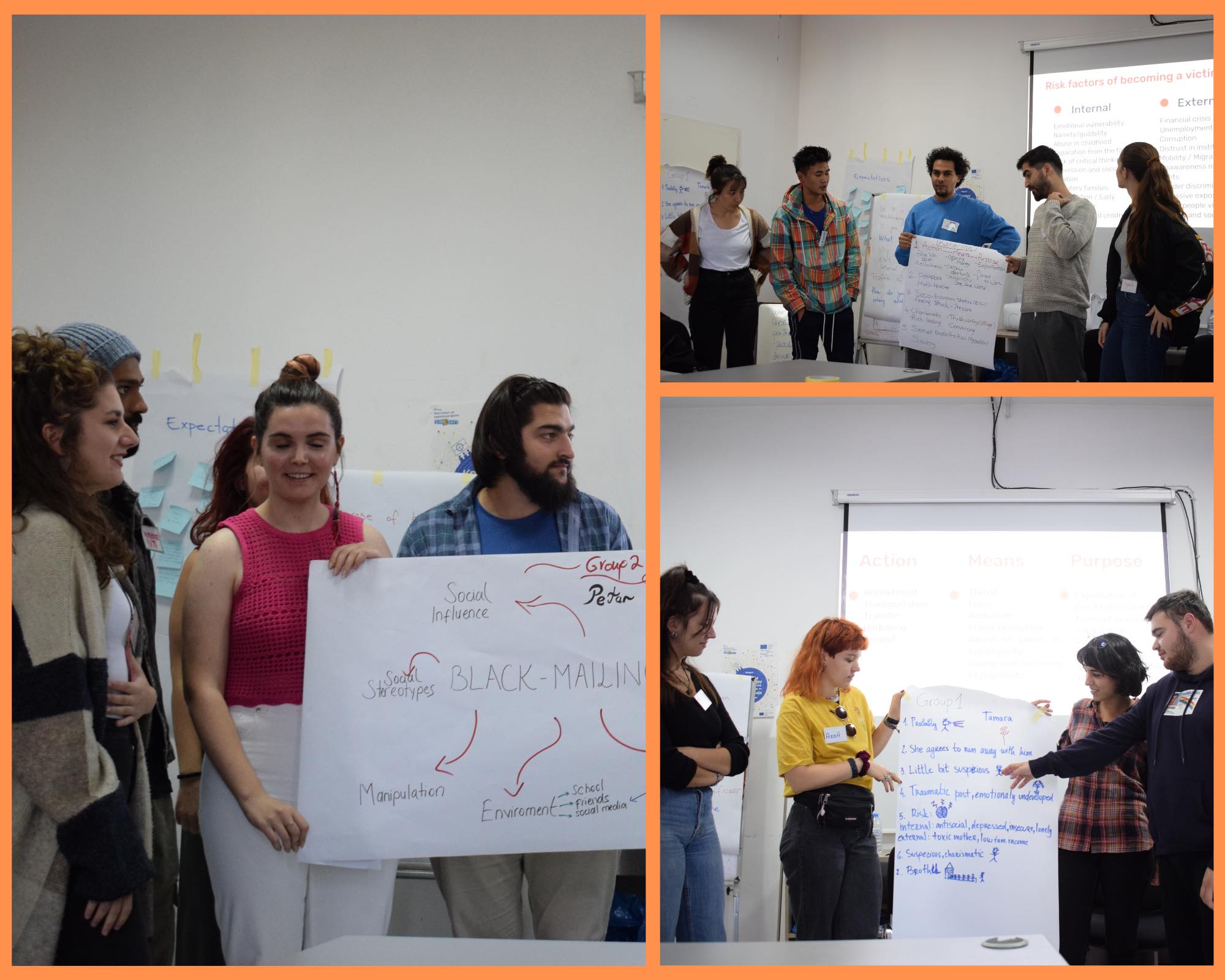 |
|
Open Gate – La Strada hosted youth workers from Greece, Germany, Turkey and North Macedonia in October 2022 to raise understanding and skills to identify and prevent trafficking |
MLN: What prompted your recent shift in focus to include labour exploitation and labour rights as well?
JDR: Labour exploitation is actually one of the forms of exploitation in the definition of trafficking. People are trafficked for sexual exploitation, for labour exploitation, for organs removal, for domestic work… for different purposes of exploitation.
In Macedonia, most of the cases identified are cases of trafficking for the purpose of sexual exploitation, but sometimes combined with labour exploitation – victims were forced to work in nightclubs, bars or as waiters or dancers.
In our network, we also realised that there is a lot of labour exploitation in the country that may not meet the definition of trafficking because not all the elements of trafficking are present, like recruitment, transportation etc, but people are nevertheless being exploited. This can be taking place in factories where people are not paid even the minimum wage or overtime, and very often they haven’t received any salary at all for many months. This is a breach of their labour rights but these cases are often on the borderline of the definition of trafficking.
Often these people are being exploited because there are no other options for them. In rural areas and small towns, there are not many options for employment so people are forced to accept exploitative work. People are also not aware of their rights, they are just grateful for whatever job they have, and they don’t know how to fight for their rights.
This is why we decided to raise awareness amongst workers about their labour rights and to stand together with them to fight for their rights.
MLN: I also wanted to ask about the advocacy work that you are doing with the law on compensation. You mentioned that the hardest task will be to lobby MPs to vote for the law. Have you already done this kind of work in the past?
JDR: Yes, we have worked with parliamentarians and especially women members of parliament. The challenge is to bring MPs from different political parties to sit on the same side of the table and to unite their understanding of the benefits of this law and how it will help victims of crime. Sometimes political party priorities do not match our priorities and it requires a lot of time and energy to get on the same page.
MLN: What are some of the main challenges for trafficked persons in Macedonia?
JDR: Firstly, I would start with the moment when they are still victims and have not been identified. Identification of victims is at a very low level. Maybe this is because traffickers have changed their modus operandi - they are not using physical abuse anymore and it’s not as visible that someone is a victim of trafficking. They are using different methods to control victims.
I have to mention that the largest proportion of victims that we are working with are nationals, and so, victims of internal trafficking. It has been harder for these victims to be identified.
Once victims are identified, the challenges don’t stop. They face challenges to access justice, to access healthcare. The reintegration process is very slow and difficult because there aren’t many services for victims’ reintegration after they leave the shelter.
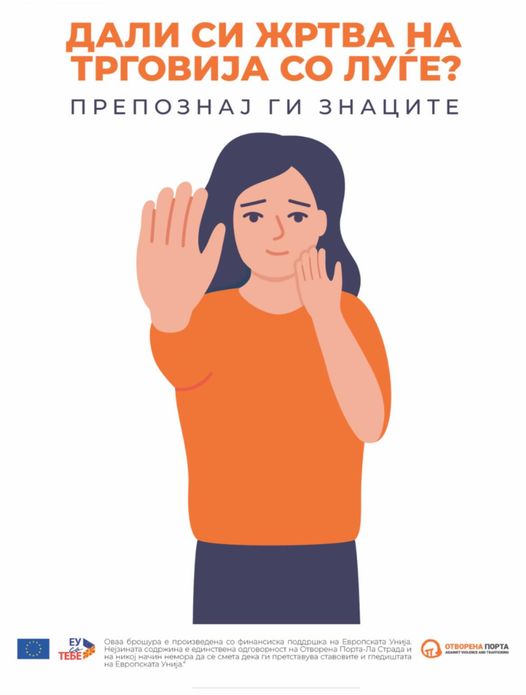 |
| Leaflets on how to recognise if someone is a victim of human trafficking |
MLN: How do you incorporate trafficked persons’ views in your work? How do you ensure that your work is informed by their lived experiences?
JDR: As we operate the shelters for victims of trafficking we are, on a daily basis, in contact with them. We are giving them opportunities to share their opinions on our prevention work, to give suggestions for how our prevention could be more efficient and how we can reach more victims.
They can also give feedback on our work and the services we provide. We are still in touch with some of our ex-clients and from time to time they are willing to tell their story to the general public to help young people get involved in anti-trafficking work.
We also organise focus groups to hear more about their opinions and needs. For example, we have shared real stories of victims with the general public about how people end up being trafficked, how they escape and how they feel now.
MLN: When you are incorporating trafficked persons’ views in your work, has there been anything surprising or anything that’s changed your strategy as a result of learning from them?
JDR: There are not many surprises in general. The methods of trafficking are more or less the same, the most common recruitment method remains the “lover boy” as well as fake job advertisements. It’s shocking that the largest proportion of recruiters are people that they already knew – relatives, friends etc.
We integrate their views and opinions into our work and this results in better services, easier access, constructive laws and regulations that reflect trafficked persons’ needs and constraints.
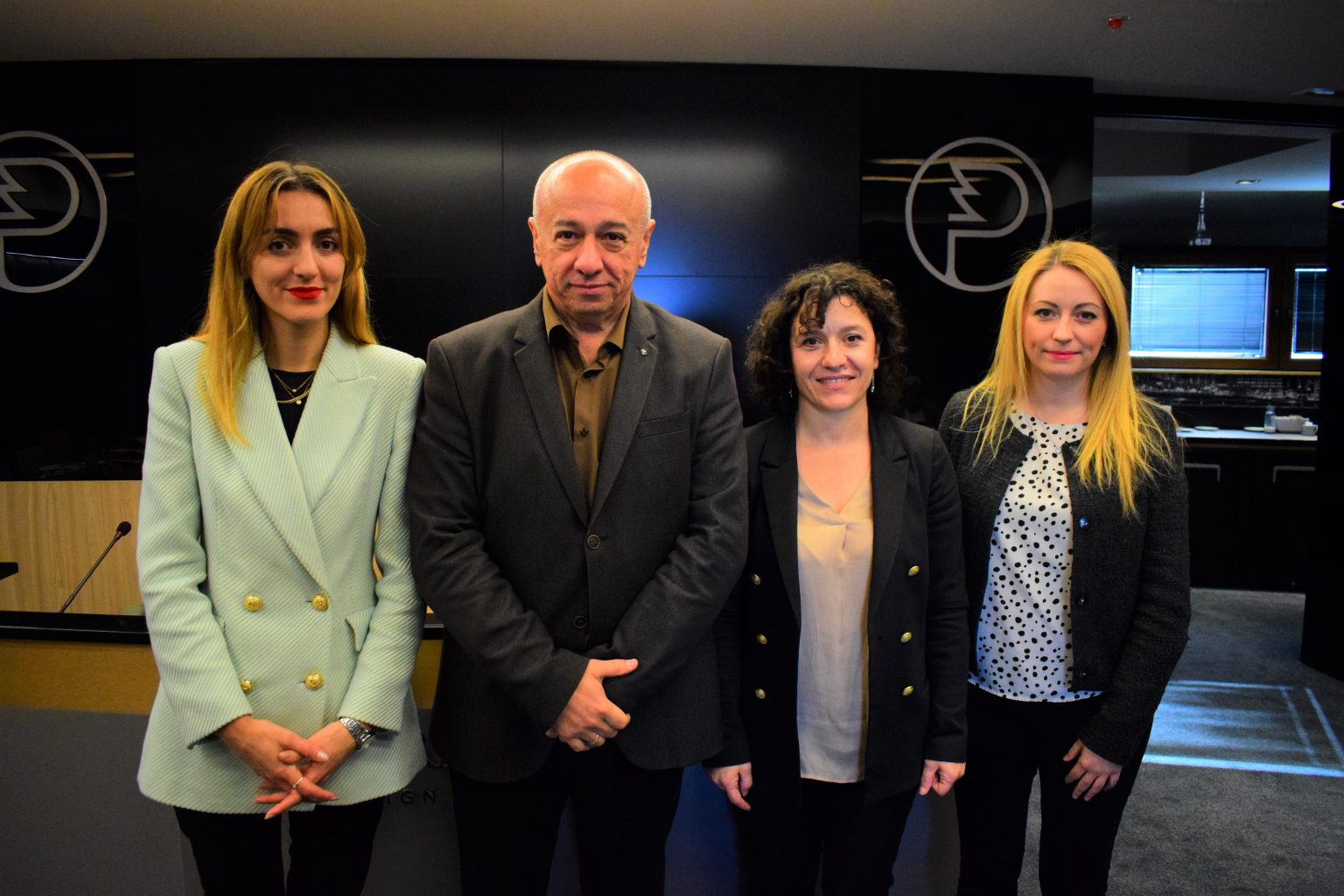 |
|
Open Gate co-organised the second cross-border meeting between North Macedonia and Kosovo aimed at transnational cooperation between the countries for the identification and assistance of victims of human trafficking, with a focus on children, through unified standard operating procedures. |
MLN: What, if anything, do you know about traffickers or migration brokers, in your country – who are they, and how do they operate?
JDR: We tend not to use the phrase migration brokers, we use “smugglers” instead.
As I mentioned, the “lover boy” method remains the most popular method of recruitment by traffickers. Our analysis shows that traffickers tend to be known by the victims.
Smugglers tend to be from organised criminal groups who communicate and operate transnationally. Sometimes these groups will pay locals to assist and lead migrants through the mountains and into the country. Smuggling often happens by foot – they walk through the forests and mountains. When smuggled persons are caught by the police, they are then put in a kind of detention centre. The police do not investigate whether any of these people may be victims of trafficking, they just treat them as irregular migrants and deport them to the country that was their first point of entry into Europe.
MLN: I don’t have any more questions. Is there anything else you would like to add?
JDR: Just that being a member of different networks like GAATW helps us as an organisation to operate our programmes and to consult and share experiences. Being a member of GAATW and La Strada really helps us and helps our clients as it gives us the opportunity to improve our services.
MLN: Thank you speaking with me and sharing your experiences.

